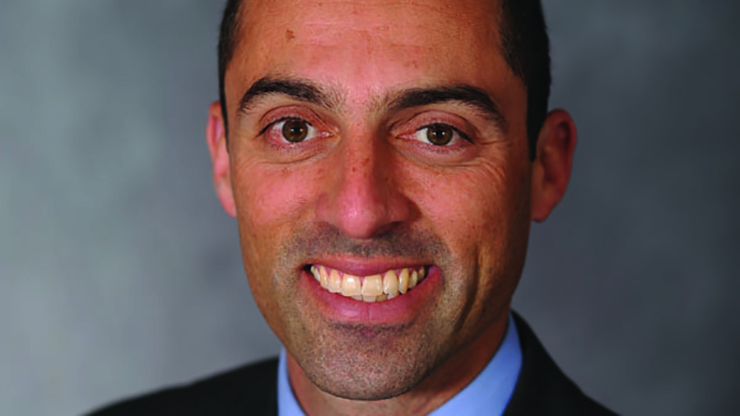David Siegel, the president and CEO of the
Los Angeles Sports Council and Southern California Committee for the Olympic Games, likes to joke he got into sports the old-fashioned way—through an internship.
“Everyone takes for granted when you grow up playing sports, you show up, the umpires are there, the balls are there, the fields are lined and you just play,” Siegel says.
While he was playing college baseball at UC-San Diego, he interned within the athletic department and quickly realized about the teams of people it takes to put on a sporting event. “It opened up my eyes that there is this whole other world around getting the games going,” Siegel says. “I decided right then and there I wanted to work in sports.”
He spent 22 years working for the Los Angeles Dodgers, rising to vice president of global partnerships, before becoming the president and CEO of the Los Angeles Sports Council and Southern California Committee for the Olympic Games in December 2018.
“You think of what’s going on in L.A. in the next 10 years it culminates with the Olympics, but there’s the World Cup, U.S. Open, Super Bowl, College Football Championship, All Star Games,” says Siegel. “It was an amazing opportunity. So now instead of just selling Dodgers Stadium, I get to sell the entire city.”
For two days, Los Angeles Sports Council and Southern California Committee for the Olympic Games will host the inaugural
Los Angeles Sports Summit on June 24-25 as a deeper dive into the world of sports in this city. The conference will include panels on sports innovation and technology, emerging sports, eSports, how to sponsor and market an Olympian (or Olympic hopeful), next generation partnerships, naming and gaming rights, sustainability in sports and the release of a Los Angeles Region Sports Economic Impact Report.
Here’s what you should know about Siegel and what he believes.
1. His trajectory has been one of incremental change.
Siegel began working inside the Dodgers’ marketing department as an unpaid intern. He then took a three-month job selling season tickets, then got a full-time job doing group ticket sales for two years before moving back into the marketing department. When News Corp. took over, Siegel began selling premium seating for the Dodgers for about eight years, building the program up from scratch.
“Getting to have input on bringing the building into the 21st century while keeping the character of the stadium was pretty special experience,” Siegel says.
He then ran the Dodgers’ general ticket sales for the past decade, which led Major League Baseball in attendance, driving revenue as well as global partnership and sales.
“As a hometown kid, to work for the Dodgers for 22 years was an incredible dream come true,” says Siegel.
2. He believes business comes first.
“If you can align yourself with a revenue producing area you can ascend quicker, you can make a name for yourself quicker, thus being able to jump to a different department or different breadth of experience easier… You may not want to sell tickets or sponsorship your entire life, but how much of a better marketer, finance person, communications person, name any job on the business side up and down?
3. He’s seen it all (almost).
“In my transformative sports years, I got to see Bo Jackson play in the Coliseum, I got to see the Dodgers win the ’88 World Series and Wayne Gretzky come to L.A.” he says. “We didn’t even know we had a hockey team till he came here. Going to a game was the most electric experience and still has stuck with me.”
4. The planning for the 2028 Olympics Games will be different.
“The guys at LA 2028 are taking a low profile by design right now. No one has ever had 10 years to kind of run up, it will be different. Out of the gate it’s a huge difference and opportunity.”
The biggest challenge (and opportunity), says Siegel is that no one knows what the next big thing will be 10 years from now, especially with L.A. being an intersection of technology, sports and entertainment.
5. You should talk a good game.
If you’re trying to get into the sports business: “Network, network, network,” Siegel says. “It's an extremely small community and everyone knows each other. Try to meet with as many people as possible.” Do informational interviews, pick other people’s brains and remember—people like to talk about themselves.
6. He has a thirst for food (and drinks).
“I’m a cultural foodie,” Siegel says. “I always tell people eating and drinking are my hobbies.”
His two must-haves: Joan’s Hollywood for Italian for its vibe and prosciutto pizza as well as Sushi Gen in downtown L.A. “Every good sushi joint here is in some kind of strip mall,” he says. “The yellow tail at Sushi Gen is like cotton candy and disintegrates in your mouth. It’s the best dish I’ve ever tasted.”
7. He is a hack.
His favorite course is Cypress Point Club in Pebble Beach, California. Locally, it’s the Riviera Country Club. “I’m not a good golfer,” Siegel says. “I’m a proud 14-handicap because I’m still a working stiff.”
8. Siegel played baseball as a left handed pitcher in Europe.
“I played in Embrach, a suburb of Zurich, for the Embrach Rainbows. The level of baseball wasn’t stellar, but it was a cool opportunity to see the world after playing in college. Not only did I play, but I coached youth baseball and softball teams.”
9. He got the Dodgers to hold his first post-graduate job.
“Two days before I was going to get on a plane to Europe, the Dodgers offered me the job, so I negotiated with them to hold the job for me for three months. These days that would never happen.”


